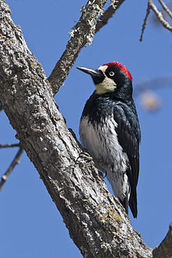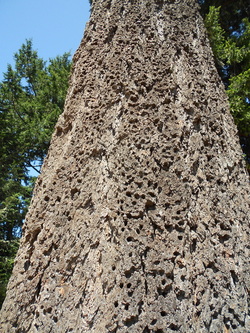 Acorn Woodpecker. Acorn Woodpecker. When I listen to Bob Dylan's classic song "Knockin' On Heaven's Door" I can't help but wonder what it was that inspired him to write such an iconic verse. Today I postulate that perhaps it was the sound of an Acorn Woodpecker, "knock, knock, knockin'" on the trunk of an old mature tree. As wonderful as Dylan and his music may be this post is in fact dedicated to the latter, the equally brilliant woodpecker. Like the iconic Dylan, the woodpecker is an icon of the avian world. Perhaps this is due to the fact that it makes its presence well known with its often hard to ignore hammering, but there is more to this wonderful Picidae than meets the ear. Woodpeckers play an important role in forest ecosystems and are often a good index of biodiversity and health within a forest.  Acorn Woodpecker holes in a Douglas Fir. Acorn Woodpecker holes in a Douglas Fir. Most notably the woodpecker serves as a cavity creator for secondhand cavity nesters. Thanks to strong beaks, woodpeckers like our friend the Acorn Woodpecker (above) encircle trees with small cavities to store acorns and attract insects for the woodpecker to eat. The woodpecker also creates larger cavities for breeding and nesting purposes. After the initial use by the woodpecker, these large cavities serve as homes for many other birds and small animals. More than just being one of nature's top carpenters the woodpecker is a common indicator of forest health. Many woodpeckers need specific habitats to thrive. The presence of decaying wood in mature deciduous forests is one such factor. A forest bereft of woodpeckers is likely to be a forest lacking mature trees and the bacteria and fungi that thrive in their presence. It is also likely to be a forest with an overpopulation of bark beetles, a common food source of woodpeckers. When beetle populations are left unchecked they can wreak havoc on tree health, furthering the decline of overall forest health.
So next time you listen to Mr. Dylan or hear the Heavenly Hammering of a woodpecker, remember how important that sound really is. It is the song of a healthy and diverse forest ecosystem, and music to appreciative ears. For more information on the importance of woodpeckers check out the study done by the Finnish Environment Institute: http://www.sekj.org/PDF/anzf43/anzf43-082.pdf
0 Comments
Leave a Reply. |
